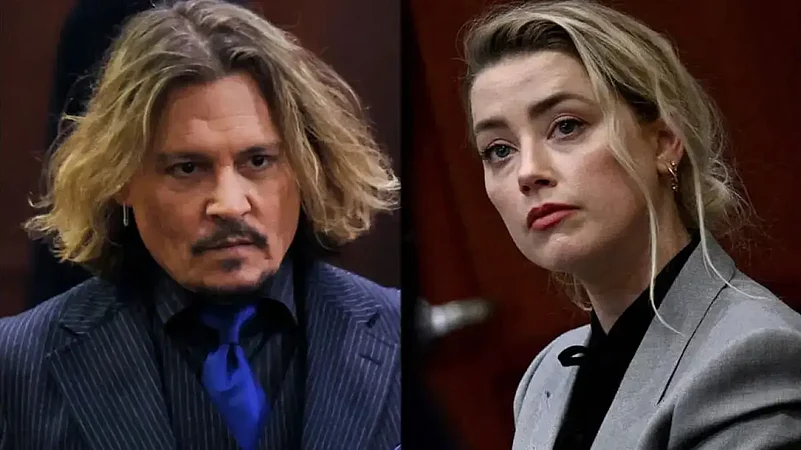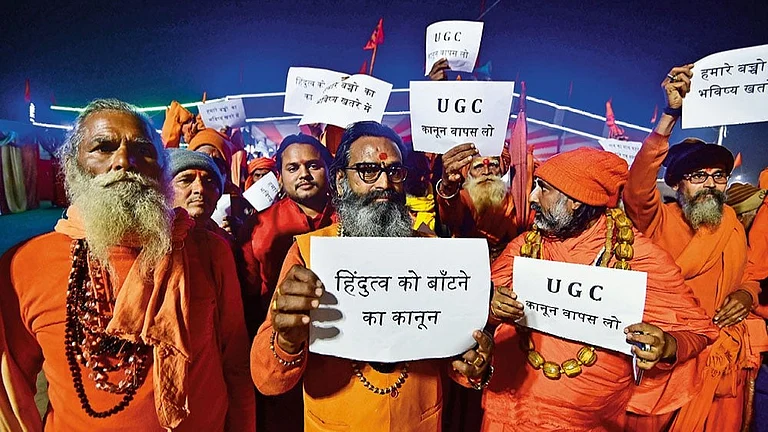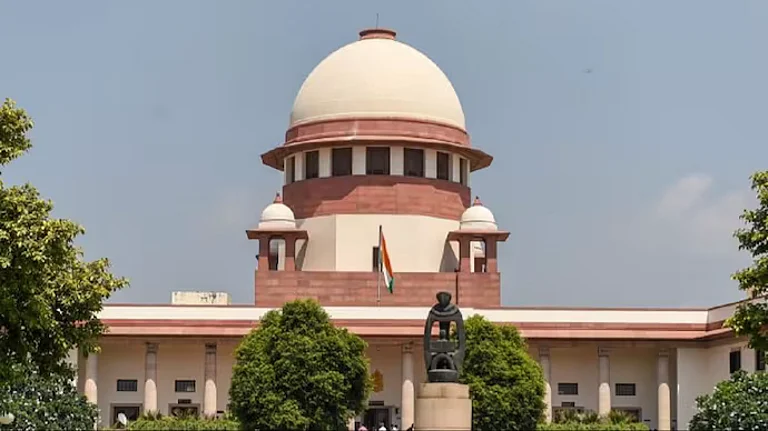Actor Johnny Depp was on Wednesday awarded $10.35 million in a defamation suit against actor and former wife Amber Heard.
The jury at the Fairfax County Court in America's Virginia ruled in favor of Depp on all three of his counts, finding that Heard had not only made false and defamatory statements, but that she had done so with "actual malice" — a higher threshold for cases involving public figures.
While Depp won the case, Heard was also awarded $2 million as the court found that a former lawyer of Depp had defamed her in the past.
The case is rooted in a 2018 article that Heard wrote, in which she called herself "a public figure representing domestic abuse". Depp argued that Heard was alleging in the article that he had abused her during their marriage. That led to him suing her for defaming him in that article.
Here we explain the current case, the widespread attention it received, what testimonies in the case revealed about Depp and Heard's marriage, what the jury said, and what experts are saying on the highly-publicised case.
The Depp-Heard case's history
Amber Heard wrote in The Washington Post in 2018: "Then two years ago, I became a public figure representing domestic abuse, and I felt the full force of our culture’s wrath for women who speak out."
Two eyars before — in 2016, Heard and Johhny Depp had announced their divorce. They got engaged in 2014 and got married in 2015.
While Heard did not name Depp in the article, she had earlier accused him of violence. The BBC reported, "According to court documents, she said Depp had been physically abusive to her, culminating in him throwing a mobile phone at her face during a fight in February last year [2016]."
The BBC added that the police did not find any evidence of a crime at the scene.
In 2019, Depp sued Heard for $50 million for defaming him. The suit he filed denied he abused her and said Heard "is not a victim of domestic abuse, she is a perpetrator".
Later, it emerged in voice recordings shared by Daily Mail that Heard had assaulted Depp. She was heard saying she had hit Depp. She also said she could not promise she would not get physically abusive again.
In another recording, Heard mocked Depp's claim of being abused. She said no one would believe that Depp — a man — was a victim.
She said, "You can tell people it was a fair fight, and then see what the jury and judge thinks. Tell the world, Johnny. Tell them, 'Johnny Depp, I, a man, I'm a victim, too, of domestic violence, it's a fair fight,' and see how many people believe or side with you."
Depp also sued the British newspaper The Sun that had called him "wife-beater" in an article in 2018. Depp lost that case and was not allowed to appeal in higher courts.
What emerged in the defamation case
While Depp said he was defamed, Heard maintained that she had exercised her free speech rights in writing The Post article which is protected by the US Constitution's First Amendment.
Depp in his testimony said the abuse from Heard pushed him towards alocohol and drugs. He said, "I was more inspired by Miss Heard to reach out for a numbing agent because of the constant clashes. I had to have something to distance me and distance my heart from those verbal attacks."
Depp also alleged that Heard once attacked her with a vodka bottle and sliced one of his fingers. He also said Heard was responsible for faecal matter found in his bed after he told her he was leaving her. A member of Depp's staff testified in court that Heard told him that defecating in the bed was "a horrible practical joke gone wrong", according to the People magazine.
A clinical pyschologist, who interviewed Heard for 29 hours, told the court that Depp forced Heard into oral sex during instances of sexual violence throughout their relationship and also penetrated her with a vodka bottle, according to The Insider. The vodka bottle incident is the same which in Depp's version ended in his finger being sliced in Heard's assault.
The best man at their wedding, Tillett Wright, said Depp said at the time said he could punch Heard in the face and nothing would happen as they were married, as per The Insider.
"We're married now. I can punch her in the face and nobody can do anything about it," said Depp, as per Wright.
Tracey Jacobs, Depp's former agent, said he romanticised drug culture and had "fundamental issues with anger". She added that he also asked her to reach out to producers of a film Heard was in to remove her nude scenes in it.
What did the jury find?
The jury ruled in favour of Depp on all three counts.
- The jury found Depp was defamed by the online headline of The Post article. While Heard argued she did not write the headline — as news organisations's editing desk gives headlines and not the author, the jury concluded Heard "made or published" it and that it was defamatory.
- The jury found Depp was defamed by a paragraph in her article that alleged Heard was abused in 2016. Heard argued that there was 'mountain of evidence' for the abuse and also that the paragraph was not about being abused but about speaking on it it.
The paragraph referred is this: "Then two years ago, I became a public figure representing domestic abuse, and I felt the full force of our culture’s wrath for women who speak out."
- The jury held Depp to have been defamed by another paragraph of the article: "I had the rare vantage point of seeing, in real time, how institutions protect men accused of abuse."
In her counter-allegations, Heard alleged she was defamed by public statements of Depp's former lawyer Adam Waldman. While the jury ruled that two of Waldman's statements cited by Heard were not defamatory, it ruled one statement given to Daily Mail was indeed defamatory.
Waldman had said Heard had fabricated the allegations in a "hoax". The jury agreed with Heard that the statement was false and defamatory and that Waldman acted with actual malice.
The significance of the verdict
While the case was of defamation — essentially a free speech case — and not of domestic abuse, it was treated as one because of allegations and counter-allegations made.
The case also received attention of because of losses Depp and Heard claimed to have suffered. Depp lost roles in the Fantastic Beasts film frenchise and the sixth instalment of Pirates of the Caribbean.
Heard also alleged that she suffered losses. She wrote in the 2018 article, "A movie I was attached to recast my role. I had just shot a two-year campaign as the face of a global fashion brand, and the company dropped me. Questions arose as to whether I would be able to keep my role of Mera in the movies 'Justice League' and 'Aquaman.'"
The case also ignited debates on the internet, which turned toxic at times as a large number of users took sides and trended hashtags either in support or against one of the parties.
The discussions that the case led to included that of male victims of domestic abuse and the issue of abusive relationships and mutual abuse, as evidence emerged against both the people during the case and its media coverage.
The internet was largely in favour of Depp. Some said it was because he is the bigger star of the two. Some people also saw the case as his domestic abuse battle.
"To read the posts [on the internet], you'd think Heard was on trial for a slew of violent crimes against Depp, not being sued over a newspaper column," noted Mel magazine in an article about how Depp's fans were rallying for him on the internet.
What experts say on the case
Marriage counselor Laurel Anderson, who counseled Depp and Heard during their marriage, told the court she considered their dynamic to be one of "mutual abuse", as per Vox.
However, Vox also highlighted the power-dynamics between Depp and Heard, which makes the case complicated.
It noted, "Johnny Depp is 23 years older than Amber Heard, exponentially more famous, and for most of their relationship was much richer than she was. Of the two of them, he was the one in the position to wield power. And in the UK, where it is extremely difficult to prove a case like this, a court has already found that Depp was most likely the perpetrator and aggressor."
The same Vox story noted that there is "compelling evidence" that both Depp and Heard acted violently towards each-other. It added that it's certainly not clear that Heard was the primary aggressor.
While this particular case received worldwide attention because of celebrity status of the parties involved, the intimate partner violence (IPV) that the case involved is experienced by around 6.6 million women and 5.8 million men each year in the United States, highlighted Kellie Lynch, a criminology and criminal justice expert at The University of Texas.
Kellie described the violence alleged throughout the case as "bidirectional violence", in which a person reports both perpetrating and being the victim of violence. She added that "mutual violence" is an incorrect label for Depp and Heard's case.
"It is problematic to label a relationship as mutually abusive even if both partners are both violent toward each other, as one partner may be violent in response to the other partner’s abuse," said Kellie in an article in The Conversation.
Echoing the conversation that the case ignited about male victims, Kellie said, "Meanwhile, IPV remains a significant problem for men, yet many men are left without the same resources as women and face unique stigma when seeking help."
Research cited by Kellie shows that around one in four women and one in ten men in the United States have experienced IPV.
(With AP inputs)


























